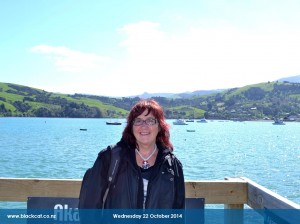It is an occassional feature of Te Tumu’s Research Blog that we profile members of our staff. This post features Associate Professor Jenny Bryant-Tokalau, who, amongst her many other activities, is currently Programme Coordinator for Pacific Islands Studies and Chair of the Postgraduate Committee in Te Tumu.
Jenny Bryant-Tokalau (or Jenny Bryant as she was then known) was born in Dunedin and is descended from a mixture of British migrants who landed on the Otago coast between Moeraki and Surat Bay in the nineteenth century. Jenny’s mother grew up in North East Valley and was a secretary and later a teacher, and her Dad was a migrant rabbiter, saddler then electric linesman from Central Otago. Jenny is the eldest of three sisters and their Mum had hopes for them to be ‘like the Bronte sisters’. Fortunately this did not (quite) happen.
Jenny first visited the Pacific as a high school student when she was lucky enough to go on a school French trip to Noumea, New Caledonia. Later as an undergraduate Geography student, here at Otago, she went on a student exchange trip to Fiji for three months to carry out voluntary work at the National Archives in Suva. After a whole row of very old and decaying files about the island of Rotuma fell on top of her, Jenny decided to return the following year to gather material for her Post graduate dissertation. Three months of visiting Rotuman island families in the low cost housing settlements in Suva, the gold mine in Vatukoula and in the first Fiji capital of Levuka led to a successful dissertation outcome, and Jenny was on her way to a life of interesting research.
In 1975 Jenny was employed as an assistant lecturer in Geography at the University of Papua New Guinea. Her classes were large, and across the spectrum of environment, human geography and cartography. During her three years there Jenny travelled widely taking students on both biogeography and urban geography in the Highlands, visiting archaeological sites and carrying out her own MA research work on low-income housing and squatting in Port Moresby, Madang and Rabaul. Jenny also worked closely with the Lae City Council and the PNG Housing Authority. Although she loved PNG where life was very exciting and varied, a PhD and job beckoned at Monash University in Melbourne. There she tutored and lectured in Geography whilst working on her PhD on Aboriginal Housing with two years of assistance from the Australian Institute of Aboriginal Studies. Again, there was much fieldwork involved with long hours driving around Victoria from the northwest corner where the small town of Robinvale is located (where Jenny picked grapes and lived in a tent in the summer to fund her research), to the south west to the Framlingham Aboriginal Trust community, to Melbourne where she worked with the Aboriginal Housing, Health and Legal boards. Part-time consultancies with the Ministry of Housing and representations to the House of Representatives on Aboriginal housing filled in her spare time when not writing the PhD dissertation.
But the Pacific beckoned again. With the PhD almost completed Jenny took a job in Geography at the University of the South Pacific in Fiji where apart from teaching, consultancies, and running an environmental NGO she carried on with her research. At first, continuing from her by now major interest in housing for the poor, she became involved with assessing the size and conditions of squatter settlements across the country, and training students in such assessments. This lead to an involvement in growing poverty and inequalities, an appointment to the Fiji government’s committee on poverty, and then to more research on land and encroaching coastal environmental issues around the squatter settlements. All through the years at USP Jenny carried out work for various UN and regional agencies, especially the South Pacific Regional Environment Programme. Eventually she was kidnapped by UNDP and spent the next six years travelling around the Pacific and Asia working as a Sustainable Development Adviser and Head of Global Environment Facility programmes. In 2002 Jenny and family decided to return to NZ, to enable her husband Filipo to complete his PhD and for Jenny to take care of her mother. On Tino joined George St Normal School and Jenny worked firstly in Anthropology before joining Te Tumu. Her research continues in the Pacific, especially her other home of Fiji where she works largely around coastal urban land (the qoliqoli) and the urban poor, as well as on artificial islands as a response to climate change. Jenny has recently been appointed as an adjunct professor at USP where she maintains very close ties.
Click here to see Jenny’s research outputs, grants & distinctions, and supervisions on her official staff page.



One thought on “Profiling: Jenny Bryant-Tokalau”
Fascinating – a rich and interesting life. I’m enjoying these profiles. Te mutunga kē mai o te pai! Great stuff!